A quick reminder to everyone, our new $mart Direction$
series of financial education programs kicks off next week on Thursday,
November 5th! Dr. Andreas Rauterkus will
talk on understanding the structure of the U.S. banking system and the roles of
both the Federal Reserve and the FDIC in managing and protecting your
money. The doors open at 6pm and a light
meal will be served. The program begins
promptly at 6:30pm. Can’t make the
meeting? The series will be recorded and
available through our website or on DVD.
The next Genre Reading Group meeting will take place on
Tuesday, November 24th at 6:30pm and the topic up for discussion will be
animals and pets. That will be the
Tuesday before Thanksgiving, so you get bonus points for bringing out of town
guests with you to book group! ;-)
Yesterday evening we discussed one of my very favorite
genres, historical fiction! In a 2012 New Yorker article,
Hilary Mantel (Wolf Hall) offers this very apt description of the genre:
“Historical fiction is a hybrid form, halfway between fiction and nonfiction. It is pioneer country, without fixed laws. To some, if it is fiction, anything is permitted. To others, wanton invention when facts are to be found, or, worse, contradiction of well-known facts, is a horror: a violation of an implicit contract with the reader, and a betrayal of the people written about. Ironically, it is when those stricter standards of truth are applied that historical fiction looks most like lying.”
As to the time periods involved, the last time I saw a date
ascribed to it, historical fiction applied to anything WWII and prior. I’d venture to say the definition has shifted
a bit since I read that. When would YOU
place the cutoff for historical fiction?
I chose a book set in the mid 1970’s, mainly because the main character
is a composer of film scores whose agent turns down an opportunity for him to
score the upstart American film, Star Wars, because he doesn’t want his client’s
reputation to be ruined by a film that’s going to flop. Teehee! That’s a bit too recent for some, and certainly old to others but I
guess it all depends on who’s keeping score.
On to the list!

The Voices by F. R. Tallis
(bn.com) From Edgar nominee F. R. Tallis, a new novel of
psychological suspense that reinvents the classic haunted-house tale. In the
scorching summer of 1976—the hottest on record—Christopher Norton, his wife
Laura and their young daughter Faye settle into their new home in north London.
The faded glory of the Victorian house is the perfect place for Norton, a
composer of film soundtracks, to build a recording studio of his own. But soon
in the long, oppressively hot nights, Laura begins to hear something through
the crackle of the baby monitor. First, a knocking sound. Then come the voices.
For Norton, the voices mark an exciting opportunity. Putting his work aside, he
begins the project of a lifetime—a grand symphony incorporating the voices—and
becomes increasingly obsessed with one voice in particular. Someone who is
determined to make themselves heard . . .
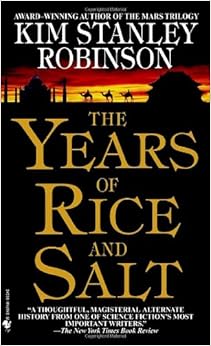
The Years of Rice and Salt by Kim Stanley Robinson
(bn.com) It is the fourteenth century and one of the most
apocalyptic events in human history is set to occur–the coming of the Black
Death. History teaches us that a third of Europe’s population was destroyed.
But what if? What if the plague killed 99 percent of the population instead?
How would the world have changed? This is a look at the history that could have
been–a history that stretches across centuries, a history that sees dynasties
and nations rise and crumble, a history that spans horrible famine and
magnificent innovation. These are the years of rice and salt.
This is a universe where the first ship to reach the New
World travels across the Pacific Ocean from China and colonization spreads from
west to east. This is a universe where the Industrial Revolution is triggered
by the world’s greatest scientific minds–in India. This is a universe where Buddhism
and Islam are the most influential and practiced religions and Christianity is
merely a historical footnote.
Through the eyes of soldiers and kings, explorers and
philosophers, slaves and scholars, Robinson renders an immensely rich tapestry.
Rewriting history and probing the most profound questions as only he can,
Robinson shines his extraordinary light on the place of religion, culture,
power, and even love on such an Earth. From the steppes of Asia to the shores
of the Western Hemisphere, from the age of Akbar to the present and beyond,
here is the stunning story of the creation of a new world.

The Doomsday Book by Connie Willis
(bn.com) For Kivrin, preparing an on-site study of one of
the deadliest eras in humanity's history was as simple as receiving
inoculations against the diseases of the fourteenth century and inventing an
alibi for a woman traveling alone. For her instructors in the twenty-first
century, it meant painstaking calculations and careful monitoring of the
rendezvous location where Kivrin would be received.
But a crisis strangely linking past and future strands
Kivrin in a bygone age as her fellows try desperately to rescue her. In a time
of superstition and fear, Kivrin — barely of age herself — finds she has become
an unlikely angel of hope during one of history's darkest hours.
Five years in the writing by one of science fiction's most
honored authors, Doomsday Book is a storytelling triumph. Connie Willis draws
upon her understanding of the universalities of human nature to explore the
ageless issues of evil, suffering and the indomitable will of the human spirit.
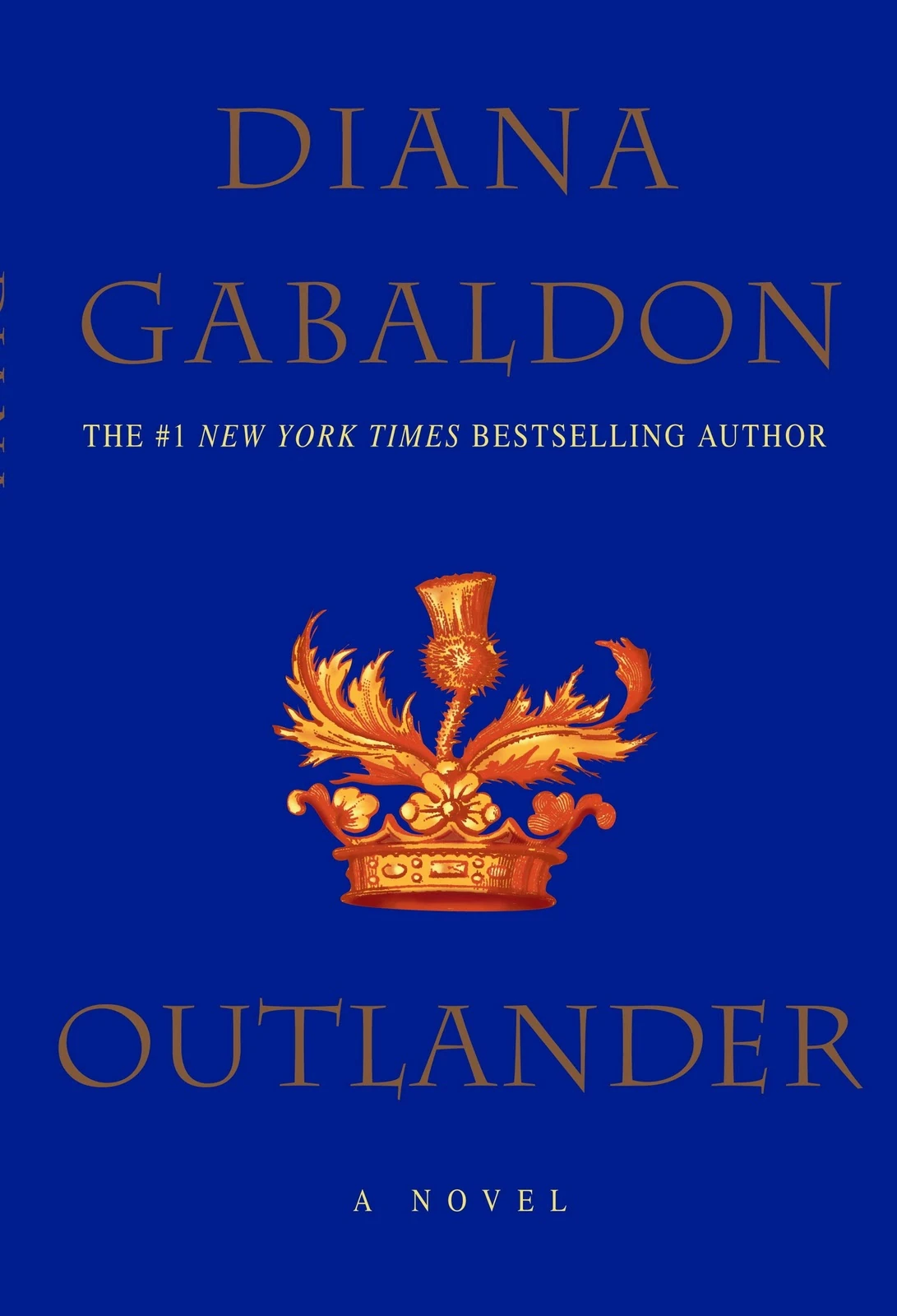
Outlander by Diana Gabaldon
(bn.com) Scottish Highlands, 1945. Claire Randall, a former
British combat nurse, is just back from the war and reunited with her husband
on a second honeymoon when she walks through a standing stone in one of the
ancient circles that dot the British Isles. Suddenly she is a Sassenach—an
“outlander”—in a Scotland torn by war and raiding clans in the year of Our Lord
. . . 1743.
Claire is catapulted into the intrigues of a world that threatens her life, and may shatter her heart. Marooned amid danger, passion, and violence, Claire learns her only chance of safety lies in Jamie Fraser, a gallant young Scots warrior. What begins in compulsion becomes urgent need, and Claire finds herself torn between two very different men, in two irreconcilable lives.
Claire is catapulted into the intrigues of a world that threatens her life, and may shatter her heart. Marooned amid danger, passion, and violence, Claire learns her only chance of safety lies in Jamie Fraser, a gallant young Scots warrior. What begins in compulsion becomes urgent need, and Claire finds herself torn between two very different men, in two irreconcilable lives.
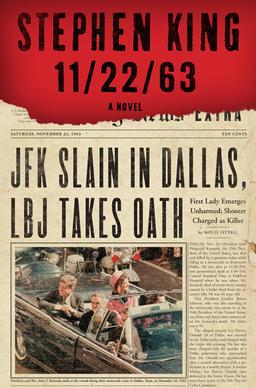
11/22/63 by Stephen King
(bn.com) Dallas, 11/22/63: Three shots ring out. President
John F. Kennedy is dead.
Life can turn on a dime—or stumble into the extraordinary,
as it does for Jake Epping, a high school English teacher in a Maine town.
While grading essays by his GED students, Jake reads a gruesome, enthralling
piece penned by janitor Harry Dunning: fifty years ago, Harry somehow survived
his father’s sledgehammer slaughter of his entire family. Jake is blown
away...but an even more bizarre secret comes to light when Jake’s friend Al,
owner of the local diner, enlists Jake to take over the mission that has become
his obsession—to prevent the Kennedy assassination. How? By stepping through a
portal in the diner’s storeroom, and into the era of Ike and Elvis, of big
American cars, sock hops, and cigarette smoke... Finding himself in warmhearted
Jodie, Texas, Jake begins a new life. But all turns in the road lead to a
troubled loner named Lee Harvey Oswald. The course of history is about to be
rewritten...and become heart-stoppingly suspenseful.

City of Thieves by David Benioff
(bn.com) During the Nazis’ brutal siege of Leningrad, Lev
Beniov is arrested for looting and thrown into the same cell as a handsome
deserter named Kolya. Instead of being executed, Lev and Kolya are given a shot
at saving their own lives by complying with an outrageous directive: secure a
dozen eggs for a powerful Soviet colonel to use in his daughter’s wedding cake.
In a city cut off from all supplies and suffering unbelievable deprivation, Lev
and Kolya embark on a hunt through the dire lawlessness of Leningrad and behind
enemy lines to find the impossible.
By turns insightful and funny, thrilling and terrifying, the New
York Times bestseller City of Thieves is a gripping, cinematic
World War II adventure and an intimate coming-of-age story with an utterly
contemporary feel for how boys become men.
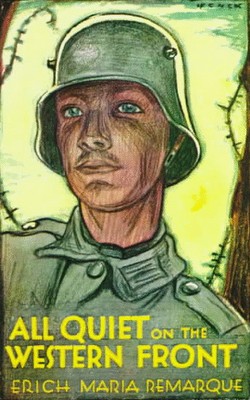
All Quiet on the Western Front by Erich Maria Remarque
(bn.com) Paul Baumer enlisted with his classmates in the
German army of World War I. Youthful, enthusiastic, they become soldiers. But
despite what they have learned, they break into pieces under the first
bombardment in the trenches. And as horrible war plods on year after year, Paul
holds fast to a single vow: to fight against the principles of hate that
meaninglessly pits young men of the same generation but different uniforms
against each other—if only he can come out of the war alive.
GENERAL DISCUSSION: All Quiet on the Western Front was
adapted to the big screen in 1930, 1979, and is in development for a possible 2016
remake as well.

The Lady and the Unicorn by Tracy Chevalier
(bn.com) A tour de force of history and imagination, The
Lady and the Unicorn is Tracy Chevalier’s answer to the mystery behind one
of the art world’s great masterpieces—a set of bewitching medieval tapestriesthat hangs today in the Cluny Museum in Paris. They appear to portray the
seduction of a unicorn, but the story behind their making is unknown—until now.
Paris, 1490. A shrewd French nobleman commissions six
lavish tapestries celebrating his rising status at Court. He hires the
charismatic, arrogant, sublimely talented Nicolas des Innocents to design them.
Nicolas creates havoc among the women in the house—mother and daughter,
servant, and lady-in-waiting—before taking his designs north to the Brussels
workshop where the tapestries are to be woven. There, master weaver Georges de
la Chapelle risks everything he has to finish the tapestries—his finest, most
intricate work—on time for his exacting French client. The results change all
their lives—lives that have been captured in the tapestries, for those who know
where to look.
In The Lady and the Unicorn, Tracy Chevalier weaves
fact and fiction into a beautiful, timeless, and intriguing literary
tapestry—an extraordinary story exquisitely told.
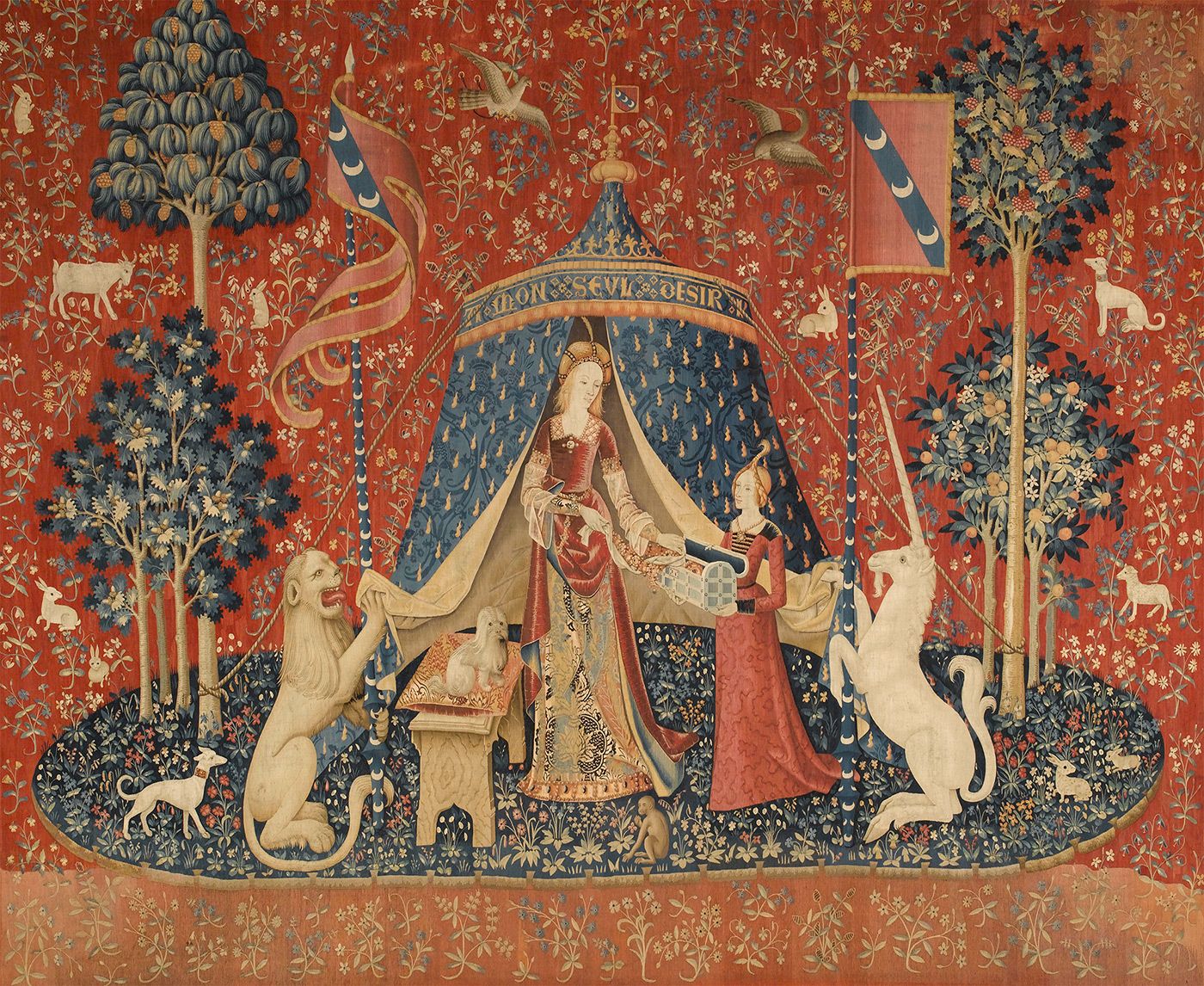
GENERAL DISCUSSION: Like most of Chevalier’s work, this
novel has a kernel of truth at it’s center.
The real lady and unicorn tapestries reside in the Cluny Museum in
Paris. Explore them here.
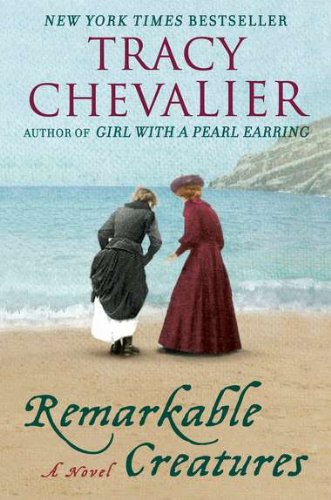
Remarkable Creatures by Tracy Chevalier
(bn.com) On the windswept, fossil-strewn beaches of the
English coast, poor and uneducated Mary Anning learns that she has a unique
gift: "the eye" to spot fossils no one else can see. When she
uncovers an unusual fossilized skeleton in the cliffs near her home, she sets
the religious community on edge, the townspeople to gossip, and the scientific
world alight. After enduring bitter cold, thunderstorms, and landslips, her
challenges only grow when she falls in love with an impossible man.
Mary soon finds an unlikely champion in prickly Elizabeth
Philpot, a middle-class spinster who shares her passion for scouring the
beaches. Their relationship strikes a delicate balance between fierce loyalty,
mutual appreciation, and barely suppressed envy, but ultimately turns out to be
their greatest asset. Remarkable Creatures is a stunning historical novel
that follows the story of two extraordinary 19th century fossil hunters who
changed the scientific world forever.
GENERAL DISCUSSION:
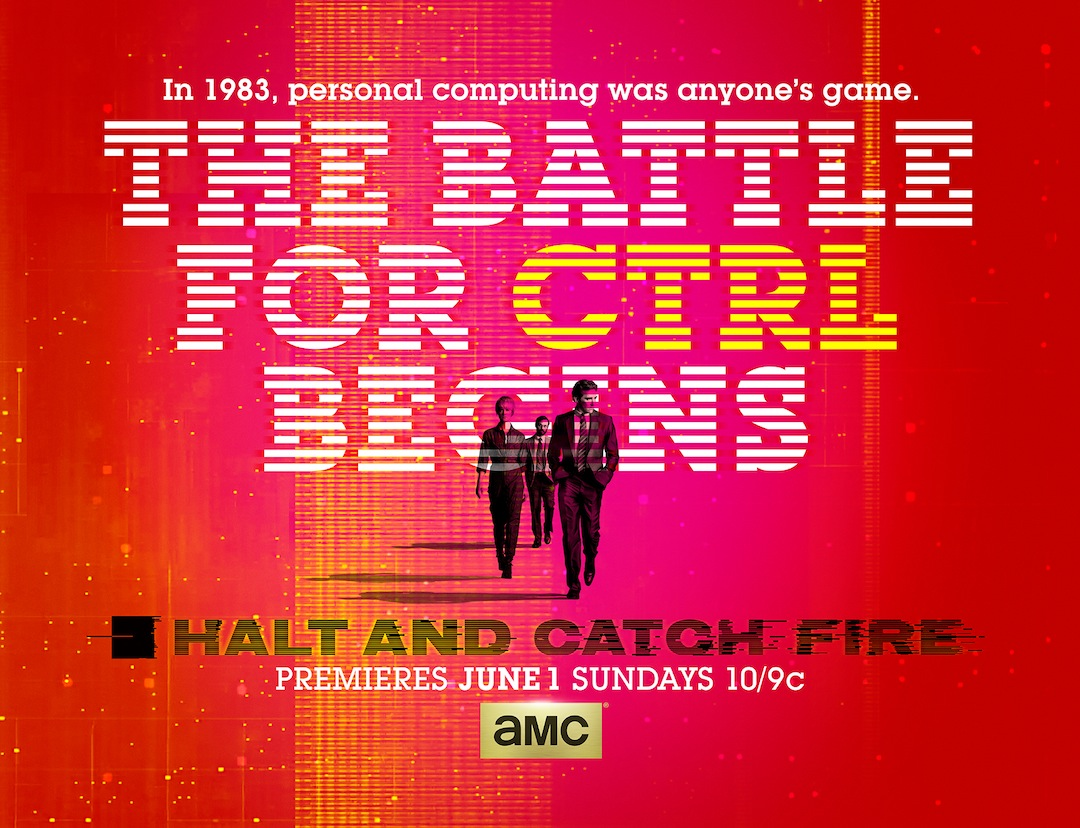
(imdb.com) Set in the early 1980s, this series dramatizes
the personal computing boom through the eyes of a visionary, an engineer and a
prodigy whose innovations directly confront the corporate behemoths of the
time. Their personal and professional partnership will be challenged by greed
and ego while charting the changing culture in Texas' Silicon Prairie.
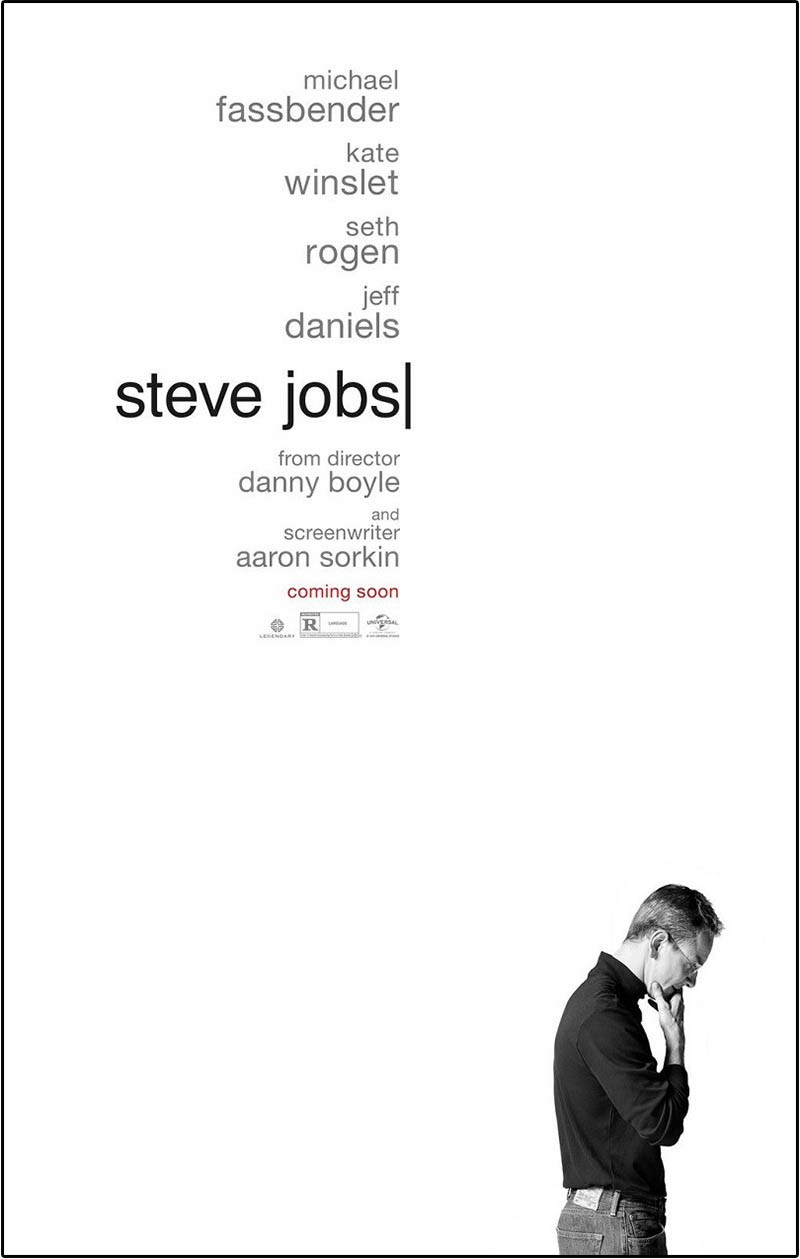
(imdb.com) Steve Jobs takes us behind the scenes of the
digital revolution, to paint a portrait of the man at its epicenter. The story
unfolds backstage at three iconic product launches, ending in 1998 with the
unveiling of the iMac.

Thirteen Moons by Charles Frazier
(bn.com) In Charles Frazier's follow-up to the runaway
bestseller, Cold Mountain, comes the story of one man's remarkable
life, spanning a century of relentless change. At the age of twelve, an orphan
named Will Cooper is given a horse, a key, and a map and is sent on a journey
through the wilderness to the edge of the Cherokee Nation, the uncharted white
space on the map. Will is a bound boy, obliged to run a remote Indian trading
post. As he fulfills his lonesome duty, Will finds a father in Bear, a Cherokee
chief, and is adopted by him and his people, developing relationships that
ultimately forge Will's character. All the while, his love of Claire, the
enigmatic and captivating charge of volatile and powerful Featherstone, will
forever rule Will's heart. In a distinct voice filled with both humor and
yearning, Will tells of a lifelong search for home, the hunger for fortune and
adventure, the rebuilding of a trampled culture, and above all an enduring
pursuit of passion.




No comments:
Post a Comment